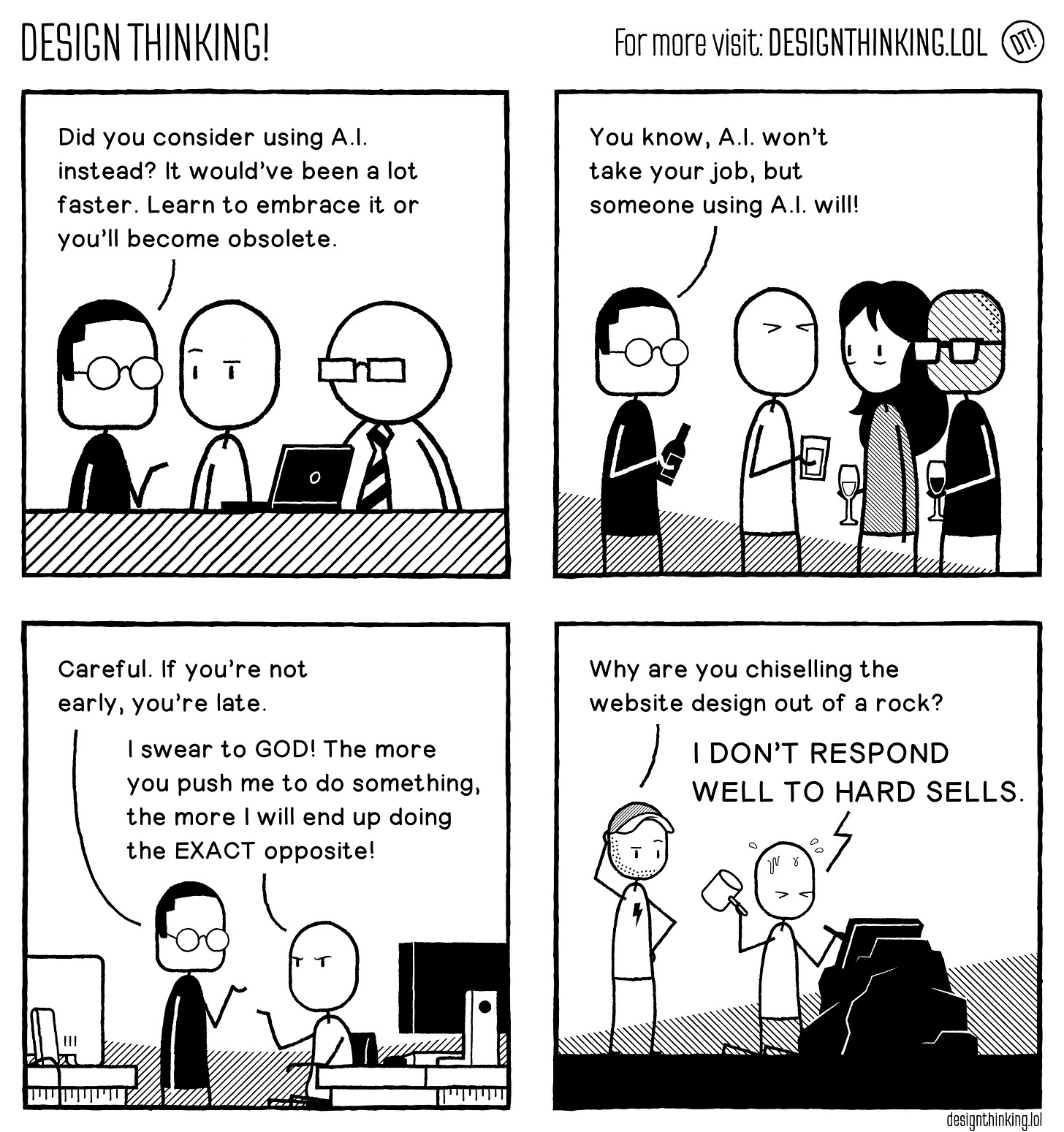I get a lot of requests for a piece on the AI 2027 paper. That’s the one that draws a lot of lines going up on a graph to show we’re getting a genuine artificial general intelligence by 2027! Then it kills us all. [AI 2027]
But the important thing about AI 2027 is that it comes straight from the hardcore AI doomsday cult nutcases.
Here in the AI bubble, you’ll see a lot of AI doomsday cultists. Their origin is the “rationalist” subculture from lesswrong.com, which is also a local Bay Area subculture. That’s nothing to do with any other historical philosophy called “rationalism”, but it’s what they call themselves.
The rationalists have spent twenty years hammering on how we need to avert AI doomsday and build the good AI instead. That’s science fiction, but they’re convinced it’s science.
I’m annoyed that this is important, because these guys are influential in Silicon Valley. They were funded by Peter Thiel for ten years, and a whole lot of the powerful tech guys buy into a lot of these ideas. Or a version of the ideas that feeds their egos.
A huge chunk of AI bubble company staff are AI doomsday cultists. Sam Altman isn’t actually a true believer, so the cultists tried to fire him from OpenAI in 2023. Ilya Sutskever and some fellow cultists went off to form Safe Superintelligence. Anthropic is full of the cultists, which is why they keep putting out papers about how the chatbot totally wants to kill you.
The rationalists also started the Effective Altruism movement. Which sounds like a nice idea — except they consider it obvious that the most altruistic project for humanity is averting the AI doomsday. This is the most effective possible altruism.
What is “rationality”?
The shortcut to a complete explanation of the rationalists is the new book More Everything Forever by Adam Becker. This book is great, and I’m not just saying that ’cos i’m in it. I cannot over-recommend it. It’s awesome. [Amazon UK; Amazon US]
Rationalism claims to be a system to make you into a better thinker. Armed with these tools, your brain will be superior and win in the real world. Sounds cool!
Rationalism was founded by a fellow called Eliezer Yudkowsky. You’ll see him quoted in the press as an “AI researcher” or similar. The media call him up cos he came up with AI doomsday as we know it.
What Yudkowsky actually does is write blog posts. He wrote up his philosophy as a million or so words of blog posts from 2006 to 2009. This collection is called The Sequences.
A lot of rationalists have not in fact read the Sequences. But the whole AI doomsday thing percolates straight from the Sequences. So the texts are useful to understand where the ideas come from.
The goal of rationality
Explaining all of rationality would take a vastly longer post than this. Read More Everything Forever. I’m not even getting to the Harry Potter fanfic, the cult of Ziz, or Roko’s basilisk today!
So let’s deal with one tiny sliver today.
The goal of LessWrong rationality is so Eliezer Yudkowsky can live forever as an emulated human mind running on the future superintelligent AI god computer, to end death itself.
Yudkowsky’s entire philosophy was constructed backwards from that goal. Being super smart obviously leads to that, see.
But. Yudkowsky realised it might go wrong if the AI didn’t care about humans and human values. Yudkowsky believes there is no greater threat to humanity than a rogue artificial super-intelligence taking over the world and treating humans as just raw materials.
So Yudkowsky has spent the years since The Sequences hammering on the AI doomsday and trying to avert it. He wrote the Sequences to convince people about the dangers of the bad AI: [LessWrong]
it got to the point that after years of bogging down I threw up my hands and explicitly recursed on the job of creating rationalists.
Scientists, philosophers, and even theologians may read the following and start yelling at the screen.
“Singletons Rule OK” — in the future, there will be a single superintelligent AI local-god computer. Whichever super-AI comes first basically just takes over everything. This is why it’s very important to make sure it values humans. Yudkowsky calls that “Friendly AI.” [LessWrong]
it’s obvious that a “winner-take-all” technology should be defined as one in which, ceteris paribus, a local entity tends to end up with the option of becoming one kind of Bostromian singleton — the decisionmaker of a global order in which there is a single decision-making entity at the highest level.
“Beyond The Reach of God” explains how this friendly-AI superintelligence, our local AI God, will prevent all human death from then on: [LessWrong]
on a higher level of organization we could build some guardrails and put down some padding; organize the particles into a pattern that does some internal checks against catastrophe.
… A superintelligence — a mind that could think a trillion thoughts without a misstep — would not be intimidated by a challenge where death is the price of a single failure.
“Timeless Identity” posits that the future AI God will not just prevent death, it’ll revive every past person it can: [LessWrong]
“Why would future civilizations bother to revive me?” (Requires understanding either economic growth diminishing the cost, or knowledge of history and how societies have become kinder over time, or knowing about Friendly AI.)
With this digital immortality plan, you might think we’re just talking about copies of you, not you. But Yudkowsky’s got you covered — “Identity Isn’t In Specific Atoms” reassures you that you are a pattern of information, you are not the particular atoms in your brain and body, because all subatomic particles of a particular kind are literally identical: [LessWrong]
Quantum mechanics says there isn’t any such thing as a ‘different particle of the same kind’, so wherever your personal identity is, it sure isn’t in particular atoms, because there isn’t any such thing as a ‘particular atom’.
“Three Dialogues on Identity” tries to get across to you how, in the fabulous future when you are running as a process on the mind of the AI God, your experiences as a human emulation living in the Matrix are just as real as your experiences in this world made of atoms. If emulated you eats an emulated banana, it’s you eating a banana: [LessWrong]
Rest assured that you are not holding the mere appearance of a banana. There really is a banana there, not just a collection of atoms.
Let’s look at “Timeless Identity” again — how any copy of you, at any time, in any many-worlds quantum branch, is you. There’s no such thing as the “original” and the “copy”. Your copies are also you. The same you, not a different you.
Also, you should sign up for cryonics and freeze your brain when you die, because the future AI God can definitely retrieve your information from the freezer-burned cell mush that was once your brain. Yudkowsky is extremely into cryonics.
If you don’t understand the post, that’s because:
It is built upon many prerequisites and deep foundations; you will not be able to tell others what you have seen, though you may (or may not) want desperately to tell them.
Now, you might think that’s a cult talking about esoteric doctrines for true believers.
We’re talking about living forever. What about the heat death of the universe, huh? “Continuous Improvement” tells us how forever means forever — because we just might escape the heat death of the universe with new physics we don’t know yet! [LessWrong]
There is just… a shred of reasonable hope, that our physics might be much more incomplete than we realize, or that we are wrong in exactly the right way, or that anthropic points I don’t understand might come to our rescue and let us escape these physics (also a la Greg Egan).
So I haven’t lost hope. But I haven’t lost despair, either; that would be faith.
Yeah, Yudkowsky talked like Sephiroth a lot in the Sequences.
Do the rationalists believe?
The current AI bubble doomsday squad do believe this stuff. Anyone who talks about “alignment”, that’s actually a rationalist jargon word meaning Friendly AI God versus AI doomsday.
This all sounds like science fiction. Because it is science fiction. The rationalists take science fiction — overwhelmingly from anime, because Bay Area rationalists are the hugest weebs on earth — and they want to make make anime real.
Imagine living in the mind of AI God with these bozos … forever.
Should you believe any of this? I mean, it’d be fun. If there’s another copy of me out there in the quantum universe or running on the mind of the future AI God, I sincerely hope he has a fun time. He’s a good chap, he deserves it.
But all of this is functionally irrelevant to you and me. Because it doesn’t exist and nobody has any idea how to make it exist. Certainly not these dweebs. We have some rather more pressing material realities to be getting on with.
Does Yudkowsky still believe?
I was arguing a bit on Bluesky about this with Professor Beth Singler, who’s someone you should listen to. She thinks Yudkowsky doesn’t really believe all that stuff any more and he’s no longer into digital immortality. She bases this on an interview she did with him a short time ago and his recent posts on Twitter [Bluesky]
It’s true that Yudkowsky is very pessimistic about AI doomsday now. He thinks humanity is screwed. The AI is going to kill us. He thinks we need to start bombing data centres.
And a lot of Yudkowsky’s despair is that his most devoted acolytes heard his warnings “don’t build the AI Torment Nexus, you idiots” and they all went off to start companies building the AI Torment Nexus.
Singler considers Yudkowsky has more or less given up on digital immortality, and now he just says “sign up for cryonics.” But I think that means Yudkowsky still believes his original statements from the late 2000s, because his vision of cryonics is the digital immortality idea.
The deepest love for humanity, or a portion thereof
While we’re talking about what rationalists actually believe, I’d be remiss not to mention one deeply unpleasant thing about the rationalist subculture: they are really, really into race and IQ theories and scientific racism. Overwhelmingly.
This started early. There’s Yudkowsky posts from 2007 pushing lists of race theorist talking points. You can see the Peter Thiel influence. The Silicon Valley powerbrokers are also very into the race science bit of rationalism. [LessWrong; LessWrong]
Scott Alexander Siskind of SlateStarCodex, a writer who a whole lot of centrists read and love, now tells his readers how they need to get into the completely discredited race theorist Richard Lynn. Scott complains that activists tried to get Lynn cancelled. The mask doesn’t come any further off than this. [Astral Codex Ten]
There was also a huge controversy in Effective Altruism last year when half the Effective Altruists were shocked to discover the other half were turbo-racists who’d invited literal neo-Nazis to Effective Altruism conferences. The pro-racism faction won. [Effective Altruism Forum, 2024; polemics.md]
Now, you might look at rationalism’s embrace of fancy racism and question just how committed they are to the good of all humanity.
If you want a rationalist to go away and stop bothering you, in real life or online, ask him how much he’s into the race science bit. If he claims he isn’t, ask him if he sits down at the table with the rationalists he knows are into the race science bit, and ask him why he sits down with those guys. He’ll probably vanish, with a slight risk he starts preaching fake racist statistics at you.



